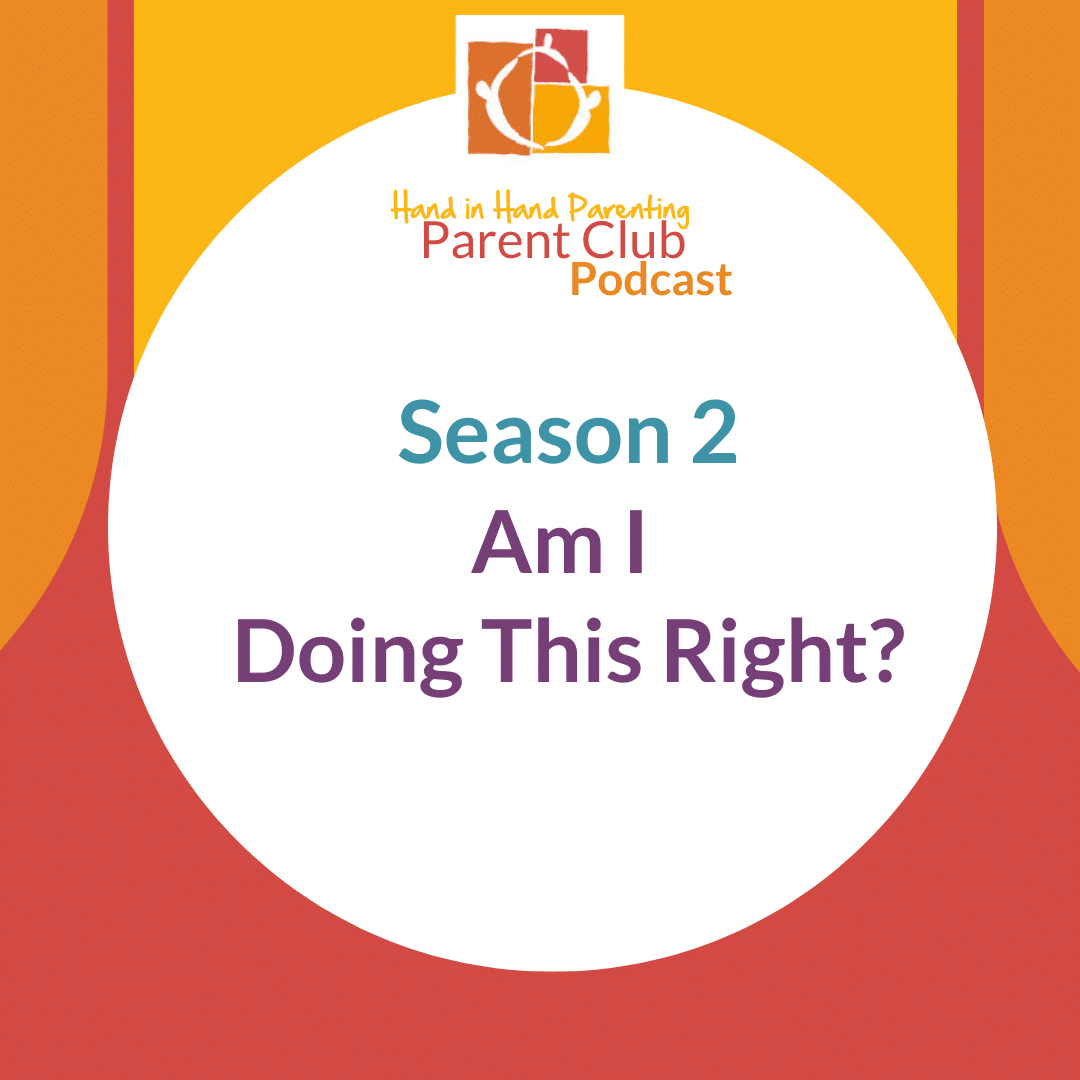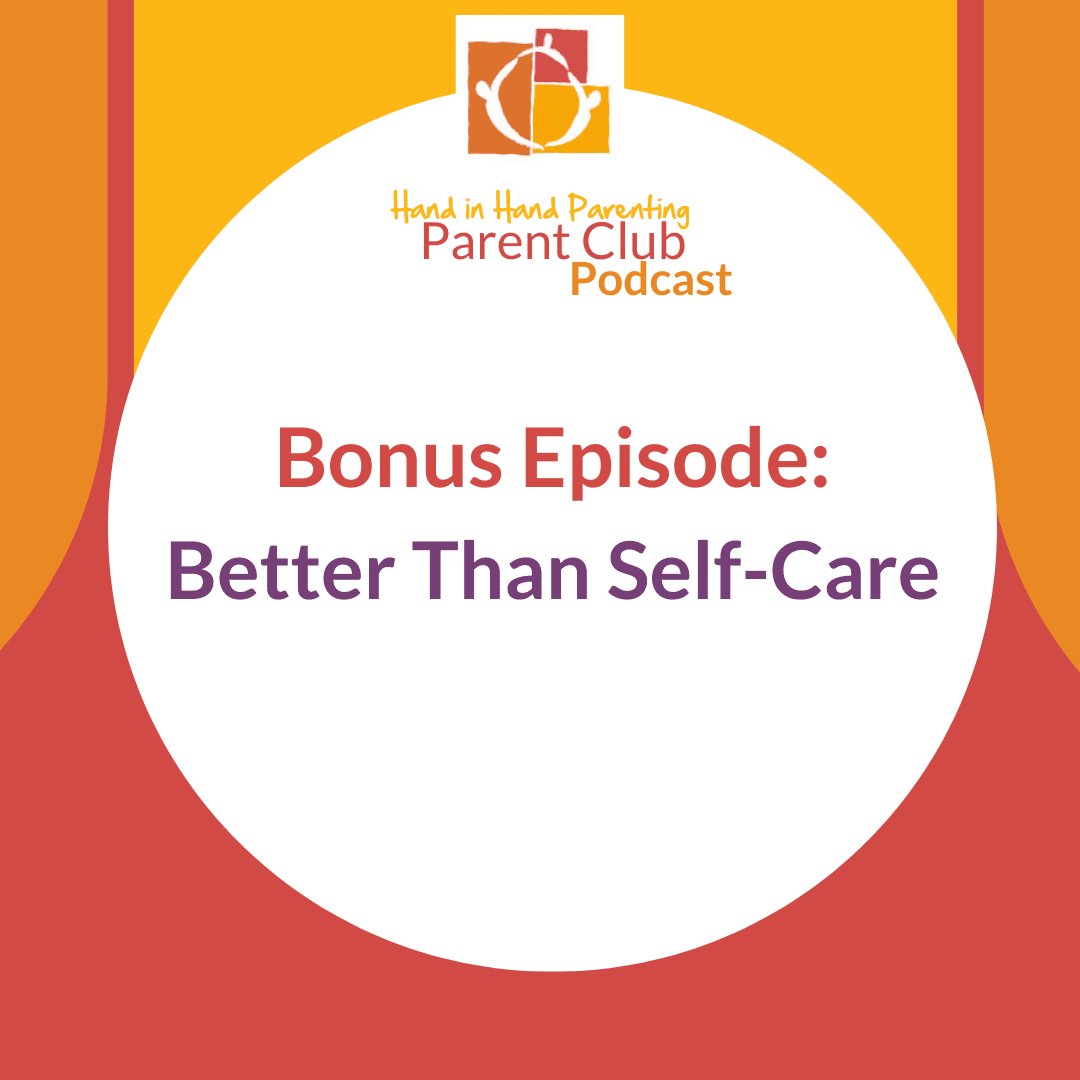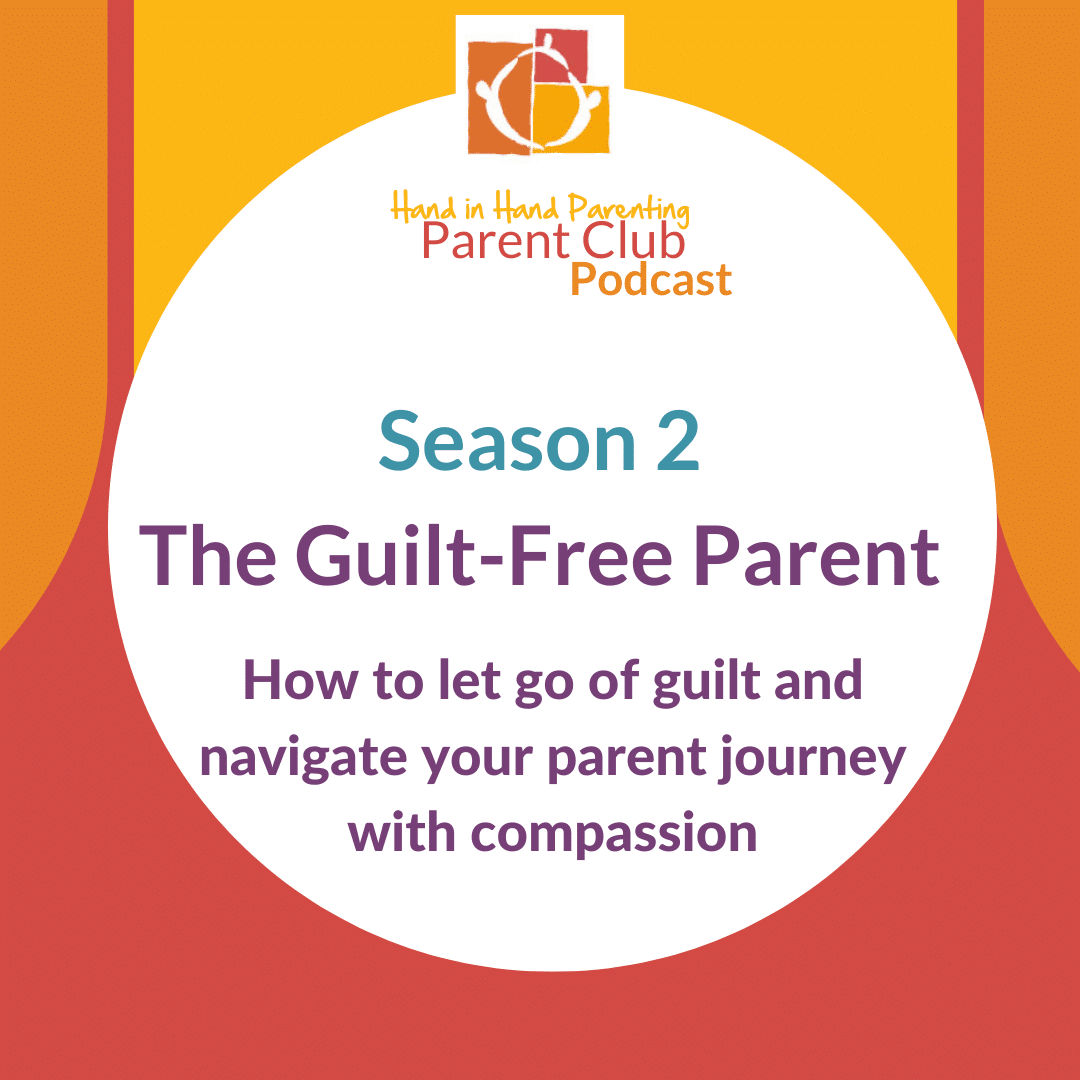Episode Transcript
Speaker 1 00:00:01 Welcome to the hand in hand parent club podcast. I'm Emily Murray, a hand in hand instructor and a mom of
Speaker 0 00:00:06 Two I'm Kathy Gordon, a single adoptive mom of a now young adult son, a hand in hand instructor. And we are both moderators of hand in hand's awesome membership program. The parent club,
Speaker 1 00:00:17 Every week, we'll be answering a parenting question. You'll hear about hand in hand. Parenting's powerful, respectful parenting tools. We'll share how they help you work with your child's feelings, especially when their behavior gets harder. Confusing.
Speaker 0 00:00:29 You can feel good about using these tools. They've brought warmth and connection to our own families and to many thousands of families around the world who are using the hand in hand approach.
Speaker 1 00:00:39 That's why hand in hand and the parent club exist. We're here to support you and your family. So you have more good, sweet, fun times together. Welcome back everyone. We're so glad you could join us today. So Kathy and I are bringing to you today. Uh, the question, why do they have such big feelings over such little tiny things?
Speaker 0 00:01:06 Yeah. Um, so we talked, we said last episode that we would talk a little bit more about early and often bringing limits early and often. And we phone a focus today on the little things, bringing a little limit that has nothing to do with anything. Um, in order to, to address what we call a pretext. Sometimes we don't know exactly why a kid WHS about, um, the color of the bowl you just gave them, or, um, you know, WHS about like just having to put their shoes on, you know, and it's, you're like, what's the deal. Like you've been putting your shoes on for weeks, you know? And, but we call this a pretext where they get upset about something little and the great thing about bringing a limit for us around something little is it, we don't really care. So we have this great article that comes along with a podcast this week that we call the yellow bowl article.
Speaker 0 00:02:08 And, um, the story goes that, um, a mom was vacationing with a, another, uh, mom and son and her son, the mom's son was just had been off track for a couple of days, just kind of whiny and cranky. And the mom, it didn't seem like there was anything big to set a limit on like he was playing okay with the other child, he was going to bed. Okay. But he was just kind of cranky and whiny during the day. So it was breakfast time. And, um, she gave him cereal in a, a yellow bowl and he whined for the red bowl. And, um, now I may be getting these colors confused when you read the article could been, he, she gave it to him, the red bowl and he winded for the yellow bowl. I don't remember exactly which, but, but at any rate you get the point.
Speaker 0 00:03:01 So the, the, the heat, when he whined for the other color bowl, she just, she thought, oh, here's an opportunity to set a little limit. I, I don't really care the red bulls clean. I could swap him out, but there's been something going on with him, something underneath. So I'm just gonna bring this little limit, say, oh, sweetie, we're using the yellow bull today. And he had a big cry in tantrum over the color of the bull. And the, the key to this is that we don't wanna fall into the trap of thinking like, oh, what is the big deal? Understanding that this is, they don't really know what's going on with them. And so this is a pretext that their limbic system is using like an opportunity to have some feelings about something they can't even articulate. So this is, this is what we call, um, bringing little, a little limit around, uh, something we don't really care about and which could invite some big feelings.
Speaker 1 00:04:05 I love thinking about these moments as, um, extracting an emotional splinter. So I don't know if you've ever had the experience of you get a splinter and it's in there deep enough, <laugh> that you don't, you don't go fishing for it that moment. And then it starts to get like red and inflamed and Uzi. And, um, when we think about feelings in this way, if we could pull emotional splinters out early and often, then we don't have to deal with the inflammation and the ness of the feelings later, because they've had a chance to get that, that feeling, whatever it is we don't, we may not even know up and out. They're they're then able to move on with their day. They don't have to limp around and try to avoid putting pressure on that spot where that painful splinter is because the healing has already happened.
Speaker 1 00:05:03 So we are doing emotional system first aid here, <laugh> early taking care of those things really early is really helpful. Um, and they will come up with all kinds of pretexts. And it's, it's important to know that these are not, this is not manipulation. This is not anything intentional on their part. It's just the best way they know how to show us that they have something going on inside their system. So, um, you know, the typical pretexts of what you offer them to wear, isn't going to work. Nothing is right. Um, you've offered two choices and nothing satisfies, um, or you can bring a little limit in that moment. So, uh, they can go to what's causing their inability to choose. And that's probably like maybe some separation anxiety. Maybe they know if they put their clothes on, then the next step is going to school and they don't really want to be a part that day.
Speaker 1 00:06:00 Or I know, I remember vividly feeling like every breath, my sister breathed near me when I was little was like, oh, the sound she's making. I can't even bear to be near her. It wasn't that she was actually loudly breathing. It was just sibling tensions had bubbled to the point where the tiniest little things she did set me off, um, because we hadn't had opportunities to offload, you know, typical sibling frustrations. Um, so when you see your child, um, pinballing from pretext to pretext, oh, my tower fell down or, oh, that drink, isn't more cold enough. Or, um, oh, my shirt doesn't feel right on my body. This is a child who is pinballing around until you can help them stop. Um, with a limit, you can set a clear limit around the choice when it's clear that they can't think well, because it's not about whatever it is that they're pinballing around to this. Isn't disrespectful to set these little limits. Um, we can listen deeply to what's bothering them. Um, we just know that in this moment of emotional first aid being needed, that they're caught up in their feelings and that if we can just get that emotional splinter out by listening well to them or getting some good laughter going, um, that they are going to feel better, they are going to, um, be, uh, able to be their real selves. It really is a gift to bring that limit.
Speaker 0 00:07:49 Uh, you know, bedtime is, is often a time where you see the, the, the pretext, um, you know, that the blanket has to be just right. The stuffies have to be lined up just right. I just, I need one more drink of water. One more book, please. And that's an opportunity really to bring, maybe you say yes to the first thing, but then to, to bring that limit, uh, before we run out of emotional gas, this is what we've been talking about. Like, we wanna bring that limit early and often, and we wanna bring it around something that's little that we don't really care about before we've reached the end of our rope. So you bedtime might be an example, you know, pestering a pet or a sibling. You know, that it, you can, you can tell that their, their nervous system is like looking for a limit.
Speaker 0 00:08:43 They're, they're, you know, they're just being a little bit off and, and you might like work out the problem one time with the sibling, but then five minutes later, you turn around and there's another problem. That's your indication that a limit is needed? You know, um, sometimes perfectionism is a, is another example of like, you know, where I, I can't, I can't, or they're just not satisfied, you know? And, um, and that, again, a, an opportunity to bring a little limit rather than trying to muddle through. So our one small thing for you this week is to, is to look for that opportunity to set a limit on, on just a little small thing, something that they're whining about, something that they're, you know, want you to do for them. Um, and, and to set it at a time that works for you. Like in that first story that I told you like about it was breakfast time, they were on vacation. The mom had the time to bring the limit about the color of the bowl. So, um, look for opportunities to set a little limit about something that you might get some big feelings about
Speaker 1 00:10:00 A, another way to, to think about this one small thing, opportunity and experiment is you can set limits, like knowing that you want your child at their best later on in the afternoon at a family event or a thing, you can look for opportunities to set those little limits in the morning so they can clear out their emotional system. We'd love to hear from you about, um, if your child is able to be their more generous cooperative selves on the other side of those little limits. Um, and next week, uh, we have a whole other tool for setting limits. Um, we've, we've touched on it a little bit here and there. Um, but it, and it doesn't involve listening to the tears and tantrums. It uses the healing power of laughter to bring connection and heal tension that is driving those, those off track behaviors. So we'll, we hope to see you there. Take care. Thank you so much for tuning into the hand in hand parent club podcast, please like, and subscribe to hear more and to connect with us between these episodes. Come on over to hand in hand parenting.org to join the parent club where you can get coaching classes and live support.
Speaker 0 00:11:07 Come join our vibrant community of parents in the parent club who are committed to getting the support they need to be the parents they wanna become. We'd be honored to support you too. This podcast, and the parent club are part of hand in hand parenting, a nonprofit organization that supports parents all over the world. We are here for you when parenting gets hard.


